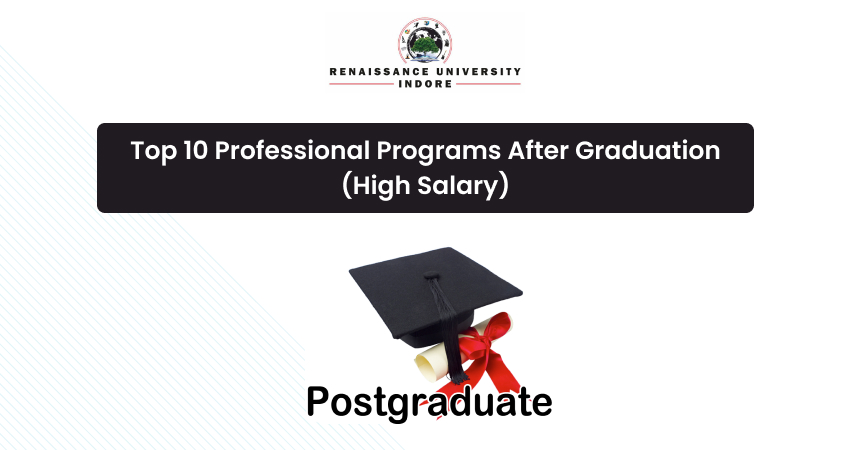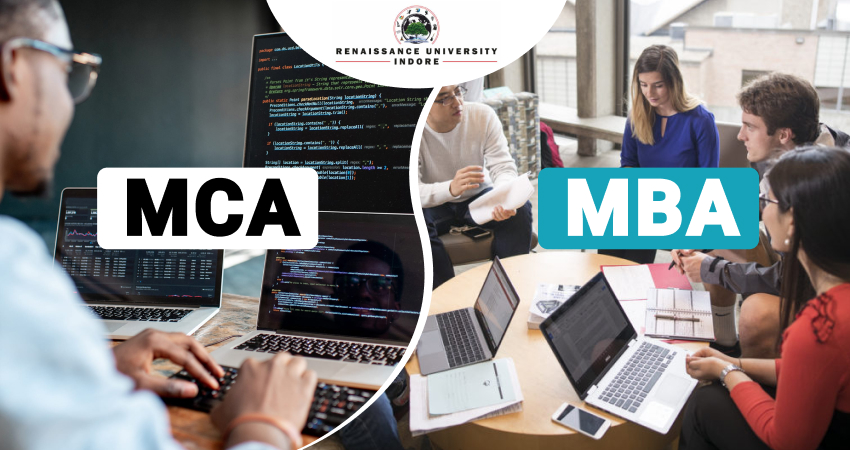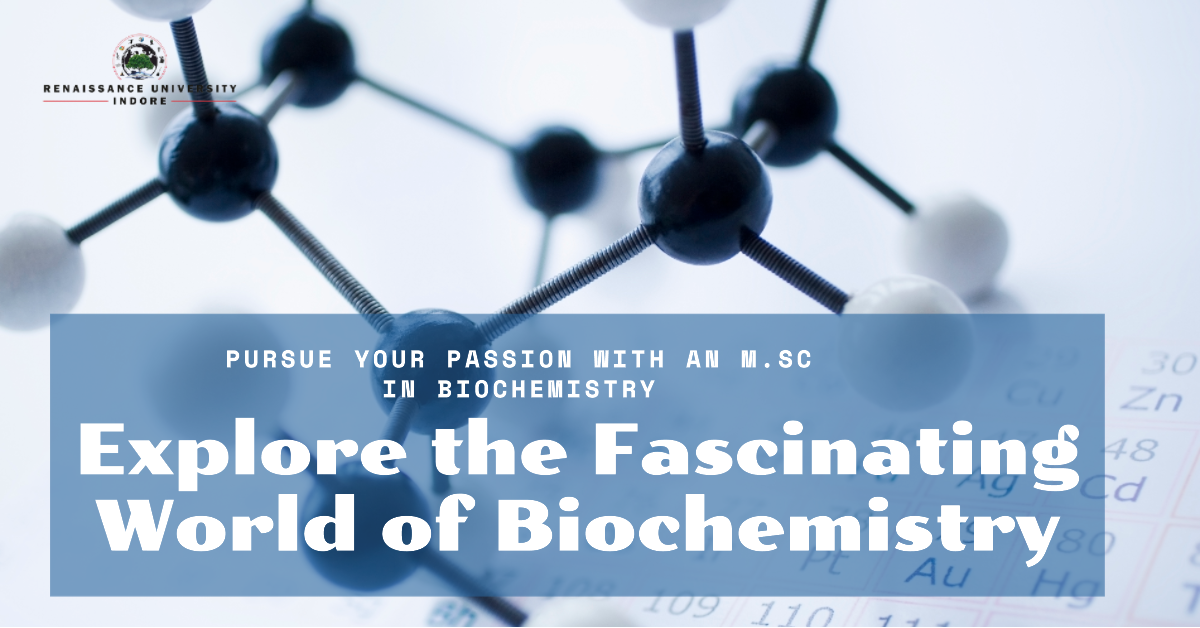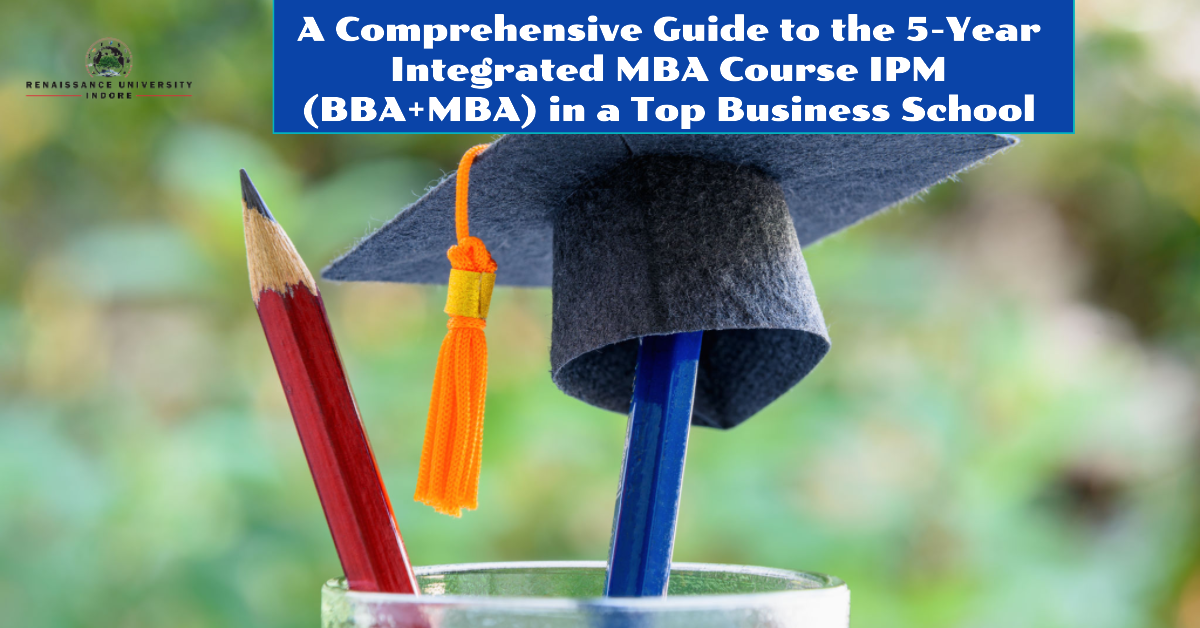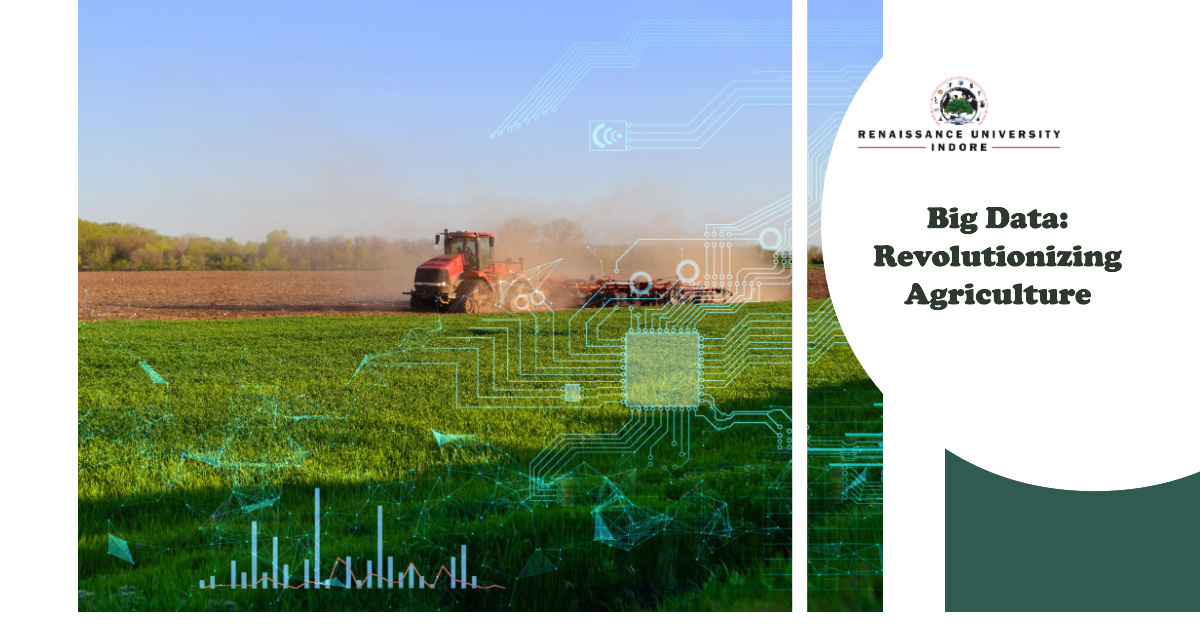Not all Bachelor’s degree programs emphasize employability. Today, most Bachelor’s programs demand further schooling to help you land higher-paying employment. Professional courses offered by the top college tend to give thorough knowledge in a particular specialization, which is required for industry-specific positions and is skill-based.
You can choose one of the professional courses after graduation from the list listed in this blog if you are also a graduate and want to improve your knowledge and skill set.
Here’s a list of the best professional courses you can pursue from Renaissance University, the best university for masters.
What Exactly Are Professional Courses?
Professional courses, when taken after graduation, focus on a particular specialization to get you ready for a job in a specific sector. In a nutshell, professional courses help you become an expert or experienced within a particular industry.
With an outstanding balance of in-depth topic knowledge, technical know-how, industry orientation, skill development components, and relevant exposure, these professional courses give learners comprehensive growth.
The goal of the professional courses is to instill in the student’s technical skills relevant to their sector. These programs assist students in gaining practical experience, preparing them for employment upon course completion.
Conversely, undergraduate degree programs emphasize theoretical notions more while attempting to provide a solid academic foundation. Professional courses offered, on the other hand, emphasize self-improvement and the development of skills necessary for the workplace.
1)Masters In Business Administration (MBA)

This one just had to be on our list. It is a 2-year professional post-graduate program that graduates take. There is no need to introduce this course. Due to the high value that an MBA carries, it is currently one of the most sought-after degrees in India and even worldwide.
The course’s variety is one of the factors contributing to its appeal. The MBA degree program offers a wide range of specializations. Marketing, human resources, finance, and many other specialties are among them. Anyone who has graduated from an institution of higher learning in any subject is eligible to obtain an MBA. You can go to Renaissance University, the best MBA college in Indore, to pursue an online or offline course.
Jobs in the sector of management are highly profitable and pay well. It’s one of the degrees that open doors to careers with the most fabulous salaries. However, the course’s tuition is also among the most expensive. The overall cost of an MBA program in India is about 20 lac. The alternative to it is an online MBA, which is comparable to a traditional MBA but costs substantially less to enroll in. In India, an online MBA costs, on average, 2 lac.
Here’s a course overview of MBA courses offered by Renaissance University
The Master of Business Administration program at Renaissance University’s School of Management is carried out across four semesters. The MBA program at Renaissance University has a different goal and stands out for its flexibility and creativity. We may be distinguished from a traditional theory-based management program with ease. A manager cannot be created in a factory with a two-year production cycle with credibility.
Renaissance University is unique in the way we help our students develop their management skills. Our goal is to create Managerial Artists who excel in decision-making, have social awareness, a broad strategic vision, the capacity to assume more corporate responsibility, a certain amount of flexibility in interpersonal relationships, and a strong emphasis on the human touch.
Numerous characteristics make it a good curriculum for applicants, including:
- Emphasizes the development of communication skills through language Laboratories and seminars led by stream specialists.
- CEO lecture series at an annual seminar
- Gaming simulations in business
- Personal development lab
- Behavioral profiling
- Seminars on personality development
- And a variety of other activities that will help develop a professional manager into a well-rounded individual.
Eligibility: Aggregate score of 50% in any graduation specialization required from an accredited university.
Duration: 2 years
Course Type: Full time
Program Fees: Rs. 68,000/year
2) Post Graduate Diploma In Management (PGDM)

Following graduation, many students enroll in the widespread Post Graduate Diploma in Management (PGDM) professional program. Since the PGDM is a diploma program, independent institutions also offer it. An online PGDM program by the best university for the master is open to anybody with a bachelor’s degree from an institution of higher learning.
The curriculum for PGDM courses is structured to provide as much industry exposure and industry-oriented learning as feasible. These programs often coach and groom you in accordance with your needs in order to prepare you for specific occupations.
After completing an online PGDM program, there are many high-paying career prospects. The job functions are comparable to those after completing an online MBA program.
Here’s an overview of the PGDM-International course offered by Renaissance University, the best college in Indore.
The Post Graduate Diploma in Management-International (PGDM-International), which has been authorized by AICTE, Govt. of India, is offered by Renaissance University’s School of Management. The PGDM-I program lasts for four semesters. The most noteworthy aspect is its implausible goal of giving the students a comprehensive view of all areas of management education, including exposure to the global scene.
The PGDM is a tailored curriculum created for those with a global perspective who wish to explore their prospects in the broader field. The learnings in this program are highly directed and focused on the “International” component in addition to the fundamentals of management education. The focus will be on how the managerial principles they learn with us will help them perform better in their overseas assignments.
Experiential learning is also given a lot of attention. Throughout their two years on campus, which also includes an eight-week summer internship, the students are obliged to work on a variety of business and academic research projects. Credibly, without practical exposure, it is all for naught. Students with this degree at Renaissance University will thus participate in a unique one-month internship at a foreign location to offer them the hands-on experience they need.
PGDM thought line
- Critical Analysis of Information
- Individual Leadership
- Industry-ready and focused on results
- The PGDM-I is unique in its approach in all respects, offering a more comprehensive General Management background and the freedom to select electives from several functional areas.
Eligibility: A recognized Bachelor’s Degree with a minimum of 50% aggregate marks.
Duration: 2 years
Course Type: Full time
Program Fees: Rs. 3,25,000/year
3) Masters Of Computer Application (MCA)
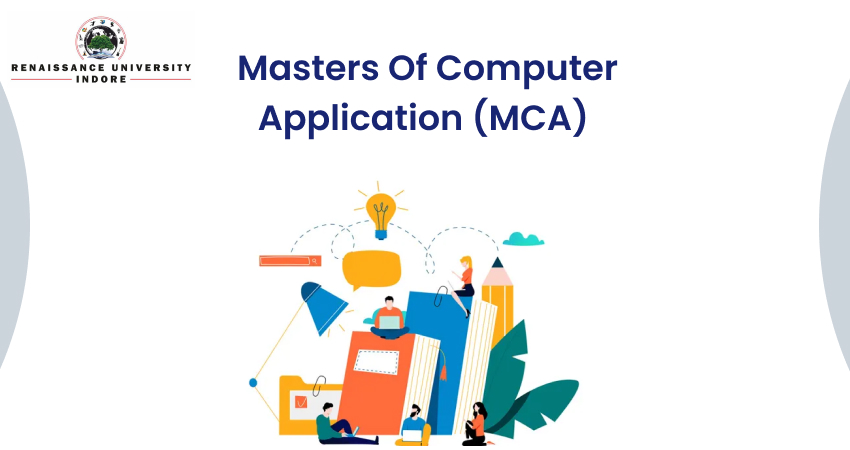
After completion, a professional 2-year postgraduate degree program called Master of Computer Applications (MCA) is available. When it comes to excellent employment prospects, it is one of the best courses. As it offers a perfect upgrade to people with only a bachelor’s degree in computer science, it is also a well-liked course among young IT workers.
A bachelor’s degree in computer applications, computer science, or information technology is required to pursue an online MCA degree. Even working IT professionals can enroll in this online course without quitting their employment in order to advance in their careers.
An online MCA program typically costs between 1-2 lac.
There is a lot of top university in Indore and other good online colleges in India that offer the online MCA program along with placement assistance services as well.
Here’s an overview of the MCA course offered by Renaissance University:
Renaissance University’s MCA program is a two-year, full-time regular degree program created for aspirants who want to succeed in the technological world. The School of Science’s curriculum emphasizes giving students a solid theoretical foundation and hands-on experience that is linked with industry needs. The graduates will establish themselves as professionals by utilizing computer science techniques, and algorithmic concepts in the modeling and creation of computer-based solutions and applications since experiential learning is given a lot of weight in this program. MCA applicants can choose from a wide range of career roles and industries/sectors, including:
- Analyst for computer systems
- Engineer or programmer for a software
- Specialist in Computer Support Services
- System Administrator, Database Administrator, Software Developer
Eligibility: An aggregated score of 50% or 45% in the case of a reserved category with graduation from BCA in computer science engineering.
Duration: 2 years
Course Type: Full time
Program Fees: Rs. 65,000/year
Post Graduate Programme (PGP)
4) M.Sc Agriculture
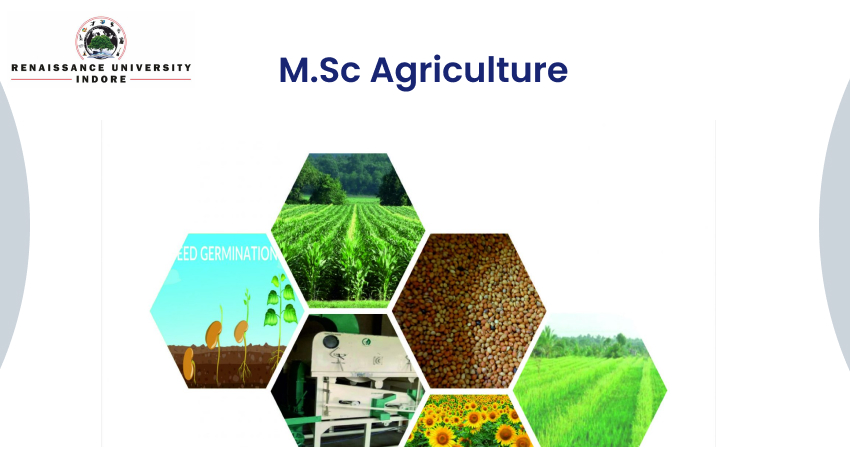
A 2-year postgraduate program called MSc Agriculture is offered by several reputable institutions of higher learning in the nation.
The course focuses mostly on agricultural studies and the many scientific techniques used in agriculture. Students must hold a BSc degree in a related field from an accredited institution, such as agriculture, horticulture, or forestry, in order to be eligible for the course.
There are several specializations available for the MSc in Agriculture, including agronomy, biotechnology, agricultural economics and farm management, plant physiology, and entomology. The course may be taken in a total of 12 disciplines.
MSc Agriculture admission may be granted directly or based on the applicant’s performance on the entrance exam. But the majority of colleges and universities now admit students based on the results of an entrance exam.
Here are key highlights of this course by Renaissance University:
Students who are interested in further study in the fields of agriculture, plant biotechnology and biochemistry, livestock breeding and management, etc., frequently pursue an M.Sc. in agriculture at the school of agriculture. After earning a B.Sc. in agriculture, it is among the most incredible postgraduate degrees offered to students. This Renaissance University curriculum features a fantastic pedagogy that is a wonderful fusion of theoretical and practical courses. Students may choose to concentrate in fields within the field of agriculture science depending on the topics they choose.
There are several specialization options available for M.Sc. Agriculture, including:
- Animal Biology
- Plantation administration
- Agricultural equipment
- Biochemistry
- Aspects of marketing and management in the agricultural industry, etc.
In order to increase agricultural output, it specifically adapts scientific and biological principles. It also focuses on the management facets of this industry. Today’s topics and subjects covered in this course include biochemistry, microbiology, plant physiology, plant biology, molecular biology, biotechnology, plant breeding, plant genetics, seed technology, agricultural meteorology, agronomy, soil science and engineering, nematology, plant pathology, agricultural economics, agricultural extension, statistics, fruit and vegetable science, floriculture, medicinal plants, ornamental plants, etc.
For a postgraduate from the School of Agriculture, there are several prospects in both the public and private sectors. State agriculture departments in the public sector hire M.Sc. (Agriculture) holders to fill officer level positions. M.Sc. (Agriculture) degree holders are also employed by government colleges to work as lecturers. Additionally, Government Banks use them to fill Officer level positions (that primarily deal with Agriculture related loans). Jobs as managers at plantations, as officers at fertilizer manufacturing companies, agricultural machinery industries, agricultural products marketing companies, food processing companies, etc., are all available in the private sector. One may also work in private colleges as a lecturer. Other alternatives are production manager and operations manager, research officer, quality assurance officer, agriculture officer, agriculture loan officer (in banks), and agriculture officer.
Eligibility: Bachelor’s degree in BSC agriculture with at least 50% in aggregate marks.
Duration: 2 years
Course Type: Full time
Program Fees: Rs. 80,000/year
5) Masters of Journalism and Mass Communication
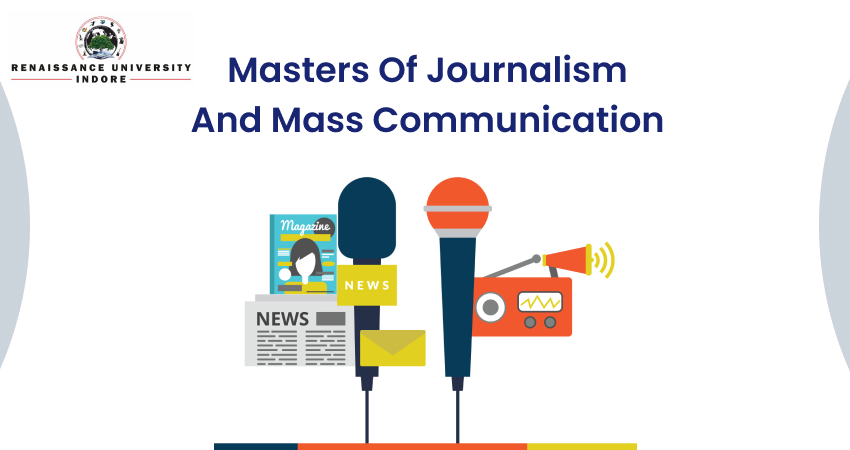
A postgraduate mass communication program with a two-year term is called MJMC (Master of Journalism & Mass Communication). The study of various mass media, including as newspapers, radio, television, cinema, etc., that disseminate information to a broad audience is a requirement of the course. Students benefit from advanced theoretical and practical expertise in a variety of media careers, including journalism, advertising, event management, public relations, and others, thanks to this course. Additionally, the course serves as a basis for people who want to pursue jobs in research. Learn about the course content, top recruiters, job profiles, and other aspects of an MJMC course.
Here are key highlights of the course offered by Renaissance University, the best college in Indore:
The School of Journalism at the Renaissance University offers a postgraduate degree called the Masters in Journalism and Mass Communication. Along with conceptual courses in Media and Cultural studies, Communication theory and research, as well as Visual studies, it offers the students experience in the fields of mass communication, video, and television. It is dedicated to providing modern, business-related media education.
The School of Journalism’s curriculum has a strong emphasis on a variety of mass communication-related topics, such as public relations, print journalism, advertising, documentary filmmaking, and television production. It aims to provide its students with the most significant journalism theory and practice possible. We employ cutting-edge instructional strategies, including the utilization of audio-visual technology, to fulfill this objective.
Eligibility: Bachelor’s degree in Mass Communication with a score of at least 50%.
Duration: 1 year
Course type: full time
Program Fees: Rs. 40,000/year
6) MA In Psychology

A Master of Arts in Psychology, or MA in Psychology, is a level of education in psychology. Two years are spent on the course. In-depth knowledge of clinical psychology, health psychology, work psychology, social psychology, neuropsychology, emotions, and paradigm studies will be provided to the students.
A bachelor’s degree from an esteemed university is a requirement for admission to the MA program in psychology. For admission to the university, students must also pass entrance tests. The majority of prestigious colleges demand that applicants have at least a degree in psychology or a distinction in psychology. A minimum of 50% of the final grade is needed at several colleges.
Here’s what Renaissance University has to follow:
Master of Arts in Psychology, sometimes known as MA Psychology, is a postgraduate program in psychology that focuses on human psychology and behavior. It is focused on a deep and detailed investigation of psychology as a field. It includes topics including motivation and the nature of the mind, crisis management, thought processes, emotional responses, and group and interpersonal conflict resolution. The goal of this course at the School of Social Science is to prepare students to recognize specific diseases as well as emotional, behavioral, and psychological problems. The trainees are instructed to develop a customized treatment strategy for every patient.
Students who possess critical thinking, compassion, patience, and the desire to advance their own development should enroll in this Renaissance University course. A sense of ethical duty and the ability to solve problems are two more qualities that fit this course. Excellent communicators are always encouraged to apply. Candidates who excel at mathematics are best suited for this course. This program is ideal for those who want to pursue a rewarding profession working with those who are battling mental illness.
Graduates of the MA in Psychology have access to various employment options in both the public and private sectors. They might do so for:
- Sections of hospitals
- NGOs Educational establishments
- Mental health facilities
- Centers for Counseling
- Business Organizations
- rehabilitative facilities
- Consultancies for education
- Various survey agencies
One may have the possibility to pursue the following job descriptions at any of the aforementioned organizations: –
- Social worker
- Social psychologist
- Recruiter\counselor
- Career and Educational Counselor
- Worker in the Community Sales Representative
- Worker in welfare, etc.
Eligibility: Minimum 50% marks in any graduation.
Duration: 2 years
Course type: full time
Program Fees: Rs. 25,000/year
7) M. LIB
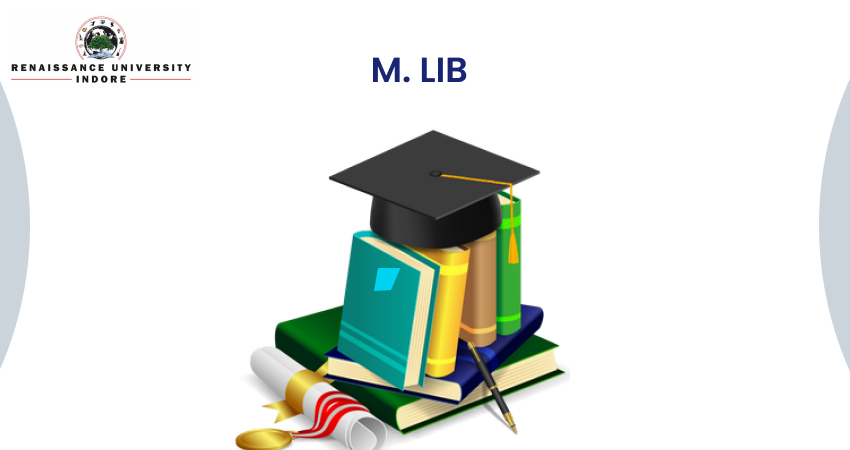
Interdisciplinary study of the principles and procedures of library management is included in the discipline of library science. Education, administration, and information technology are the three main fields with which library science is most closely related.
A postgraduate degree program in library sciences is called MLibSc, or Master of Library Science. At a number of Indian universities and colleges, the course is available as a full-time or part-time (distance learning) program. For students who want a career in research or teaching, the course acts as a foundation. Candidates who wish to seek work can, nevertheless, take advantage of the course’s attractive career options.
Admissions to the MLibSc program are mostly made on the basis of admission tests taken at the college or university level.
Here’s an overview of the course offered by Renaissance University:
The M.Lib degree at Renaissance University is an advanced study in library science that examines the theories, procedures, and administration of library science as well as how modern technology are used in those processes. The course also covers topics including knowledge management, information architecture, cataloging and categorization, preservation, research methodology, and collection management.
Since professional librarians and record managers are employed by every academic institution, including schools and colleges, the training offers a wide range of job prospects.
Eligibility: 50% marks in BLiB
Course Duration: 1 year
Course Type: Full time
Program Fees: Rs. 20,000/year
8) Masters In Fashion Management
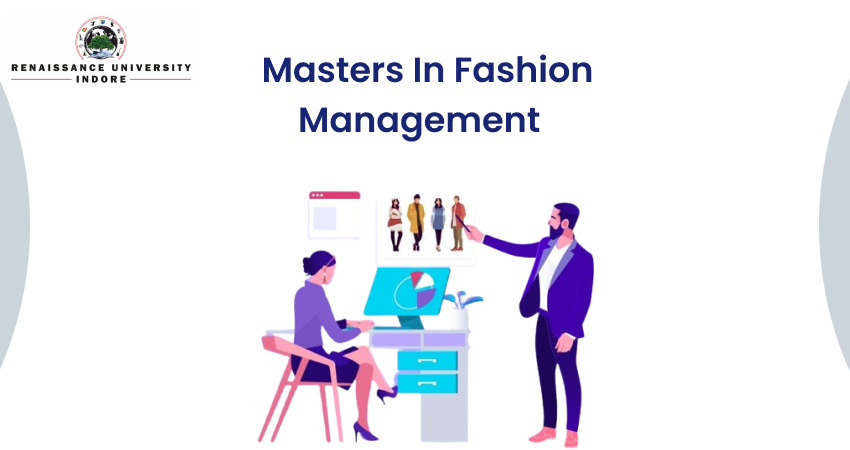
Masters in Fashion Management programs are designed with an entrepreneurial and international focus while providing an in-depth understanding of the fashion business. You’ll develop your management and creative abilities to become a dynamic business mind, and you’ll be inspired to “think outside the box” and give new ideas a shot.
The Master of Arts (MA), Master of Science (MSc), or Master of Business Administration (MBA) degrees in fashion management are available. The latter is likely to need more business or fashion expertise, whereas MA Fashion Management degrees typically place a greater emphasis on business innovation, such as by having students design a fashion magazine as one of their assessment projects.
Here’s what Renaissance University has to offer:
Renaissance University’s two-year Masters degree in Fashion Technology prepares students for techno-managerial positions in the fashion business. This course covers several range of topics, including managing operations, various operations and procedures, and clothing production. It is a progressive course that covers issues including pattern engineering, utilizing manual and computer-aided design, creating clothing, and numerous other particular ones.
The School of Fashion ensures that students are aware of technical challenges that develop due to product complexity through knowledge of the many pieces of equipment involved, ranging from fundamental mechanics to modern-era automated machinery. This makes it possible to find affordable alternatives and create associated indigenous solutions.
Eligibility: A graduate degree in any discipline with at least 50% marks.
Duration: 2 years
Course Type: Full time
Program Fees: Rs. 60,000/year
9) Post Graduate Programme (PGP)
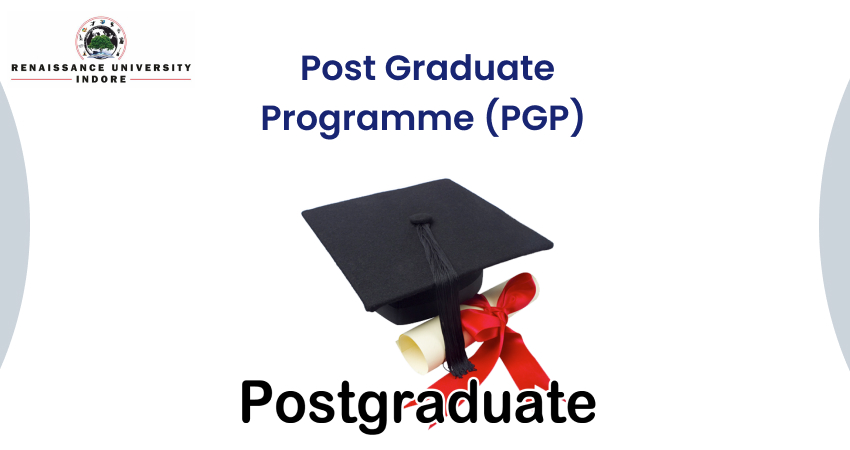
PGP is a one-year management program that is well-regarded internationally. It provides emerging managers with cross-disciplinary insights and exposure to many cultures. The program’s cutting-edge research-based and internationally recognized curriculum, delivered by the top experts in the world, is intended to improve business management abilities.
Hear what Renaissance University, the top college in Indore, has to offer:
The Post Graduate Curriculum (PGP) at Renaissance University’s School of Management is a particular program designed to prepare students for leadership roles in a complex and dynamic international environment. The PGP takes place over a period of two years, or six trimesters/four semesters, with a summer project in between. An MBA degree is equal to a Post Graduate Diploma in Management (PGDM) for PGP students.
The curriculum provides the students with knowledge of the dynamics of the corporate world and establishes the foundation for conceptual and analytical thinking. By providing this program an overview, our thought process on management education appears to be precise.
Renaissance University’s course of study focuses on the following:
- Industry-based Curriculum: By regularly interacting with the industry, we are able to design our curriculum in a way that the industry prefers.
- Use of cutting-edge instructional strategies, exposure to industry best practices, and hands-on learning
- Highlights the unique difficulties of operating in a developing economy.
- Initiatives for student self-governance, social projects, and clubs all assist in developing leadership abilities.
- Numerous grooming sessions, including interview techniques, persona development, and communication skills
To sum up, the PGP idea line is
Personalized Modern Approach Promoting Employability
Eligibility: An aggregated score of 50% in a Bachelor’s degree in any specialization or an aggregate score of 50% in the 12th standard.
Duration: 2 years
Course Type: Full time
Program Fees: Rs. 75,000/year
10) Post Graduate Diploma in Computer Applications (PGDCA)

A one-year professional program in computer applications known as the Post Graduate Diploma in Computer Applications (PGDCA) teaches students about computer applications or computer science.
The course covers the key theoretical and practical facets of creating and using computer software. During the course, the student will gain knowledge on a variety of subjects, including as web development, database management systems, and operating systems. Candidates will be qualified for a variety of careers in the computer software business after successfully completing the program.
Here’s a course overview of the PGDCA course offered by Renaissance university, a top college in Indore:
To have a successful profession in today’s cutting-edge technological environment, it is very necessary to master computers and their applications. PGDCA is a one-year professional course at Renaissance University for students interested in learning computer applications.
It is a specialized course of study for people who desire to work in the IT sector. Students participating in the course can get several chances to choose from a variety of occupations, including web developer, web designer, computer language programmer, computer programmer, software developer, ethical hacker, and many more.
The course covers both academic and practical facets of computer software development and use. The student will study areas including operating systems, database management systems, and computer networks during the semester at the School of Science.
Eligibility: Bachelor’s degree in any specification with at least 50% aggregated marks.
Duration: 1 year
Course type: Full time
Program Fees: Rs. 25,000/year





